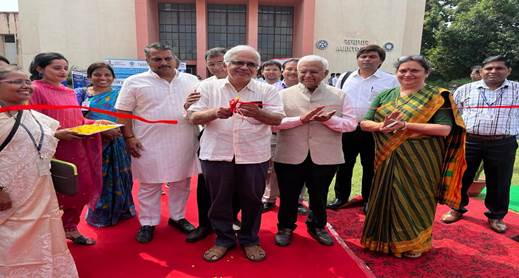CSIR-NIScPR organized the day 3 of its One Week One Lab (OWOL) programme yesterday in Delhi
The other day in the CSIR-NPL Auditorium in Pusa, New Delhi, the CSIR-National Institute of Science Communication and Policy Research (CSIR-NIScPR) held the third day of its One Week One Lab (OWOL) event. Our farmers were honoured at the "Grassroot Innovations & Skill Development Conclave for Rural Development" event. The event started off with a bang as the Chief Guest, Dr. Shekhar C. Mande, former director general of the CSIR, and Guest of Honour, Dr. Sanjay Kumar, chairman of the Agricultural Scientists Recruitment Board (ASRB), opened the exhibition.
Ranjana Aggarwal, Director of the CSIR-NIScPR, gave a welcome speech and stated, "Today's event for rural development is one of the linkages of the one week, one lab week-long event, from September 11 to September 16. Shekhar C. Mande, a former director general of the CSIR, is the one who came up with the idea of planting a seed at COVID-19.
In his remarks, the guest of honour, Sanjay Kumar, said that the "cost of the production of technology must be acceptable and affordable to the stakeholders and the technology should make a country powerful."
Yogesh Suman, the OWOL Coordinator, moderated a panel discussion about CSIR technologies and laboratories during the Technical Session of the Scientist-Farmer Interaction. The distinguished panellists included Mahendra P. Darokar, the Chief Scientist from TMD at CSIR-HQ, and Vivek Kumar, a Professor from CRDT at IIT Delhi. Other scientists from various CSIR labs also took part in the conversation, highlighting the critical importance of bridging the gap between laboratory research and everyday life. Instead of concentrating exclusively on technological readiness level, they emphasised the importance of technology suitability. The seminar was then opened up to the general public for further discussion after the scientists presented insights into their different lab-based investigations.
In his personal experience, Sanjeev Kumar Majumdar, Senior Manager, NRDC (New Delhi), said that even the pulses we eat are a product of the study carried out in one of the CSIR laboratories. He emphasised that the public interest is ultimately the goal of all research done by CSIR experts.
Vinayak, Senior Scientist from CSIR-NIScPR, introduced the app and discussed how it can be extremely helpful to farmers during the training session on the Kisan Sabha App. Senior Scientist at NIScPR and co-creator of the app, Shiv Narayan Nishad, expressed his gratitude to NIScPR for helping to shape the Kisan Sabha App. He also let the audience know that this software is currently being actively used by almost 10 lakh clients, including consumers and farmers. The app gives users access to various agricultural services as well as real-time market data. For instance, with the app, farmers may quickly check Mandi prices.
More than 50 teachers attended the science communication workshop and were trained by professionals in all areas of science communication. C B Singh, Head, Jigyasa, Training and HR Division of CSIR-NIScPR, gave the opening remarks at the workshop. Honourable Chief Guest Prof. Sharmishtha Banerjee of the University of Hyderabad stressed the need of teaching interdisciplinary science to students in her keynote talk to the workshop's science instructors. She claimed that all subjects, including biology, chemistry, physics, and mathematics, are interconnected and that we must effectively explain this to our students.
As Chief Scientist of CSIR-NIScPR and Editor of the magazine "Science Reporter," Shri Hasan Jawaid Khan, explained Science Communication and Citizen Responsibility at the workshop, "It is the duty of every citizen of the country to raise awareness about false information and fake news about science.
A presentation on the subtleties of Popular Science Writing was given to the teachers by Sonali Nagar, Associate Editor of the Science Reporter magazine. The assignment for Popular Science Writing from Shri Hasan Jawaid Khan brought the programme to a close.


